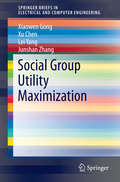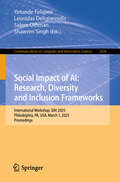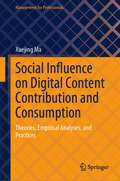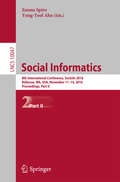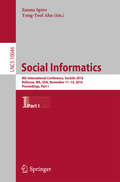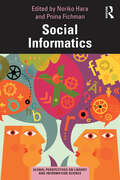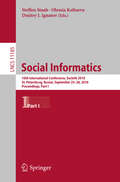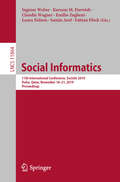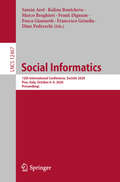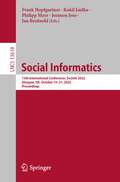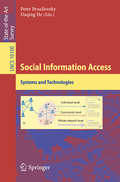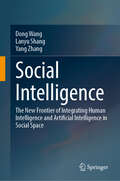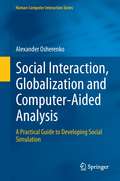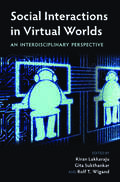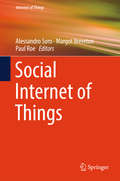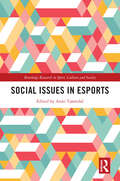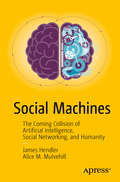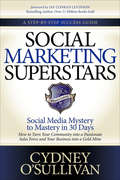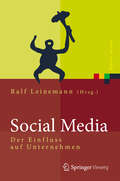- Table View
- List View
Social Engineering: The Science of Human Hacking
by Christopher HadnagyHarden the human firewall against the most current threats Social Engineering: The Science of Human Hacking reveals the craftier side of the hacker’s repertoire—why hack into something when you could just ask for access? Undetectable by firewalls and antivirus software, social engineering relies on human fault to gain access to sensitive spaces; in this book, renowned expert Christopher Hadnagy explains the most commonly-used techniques that fool even the most robust security personnel, and shows you how these techniques have been used in the past. The way that we make decisions as humans affects everything from our emotions to our security. Hackers, since the beginning of time, have figured out ways to exploit that decision making process and get you to take an action not in your best interest. This new Second Edition has been updated with the most current methods used by sharing stories, examples, and scientific study behind how those decisions are exploited. Networks and systems can be hacked, but they can also be protected; when the “system” in question is a human being, there is no software to fall back on, no hardware upgrade, no code that can lock information down indefinitely. Human nature and emotion is the secret weapon of the malicious social engineering, and this book shows you how to recognize, predict, and prevent this type of manipulation by taking you inside the social engineer’s bag of tricks. Examine the most common social engineering tricks used to gain access Discover which popular techniques generally don’t work in the real world Examine how our understanding of the science behind emotions and decisions can be used by social engineers Learn how social engineering factors into some of the biggest recent headlines Learn how to use these skills as a professional social engineer and secure your company Adopt effective counter-measures to keep hackers at bay By working from the social engineer’s playbook, you gain the advantage of foresight that can help you protect yourself and others from even their best efforts. Social Engineering gives you the inside information you need to mount an unshakeable defense.
Social First Brands: How Modern Brands Create Community, Loyalty, and Growth
by Tom MinerAs platforms come and go, features fall in and out of fashion and consumer preferences change, brands need to understand how to build social media strategies that transcend trends and create genuine connection. In Social First Brands, expert Tom Miner explores how brands who put their social media front and center in their marketing efforts are reaping the benefits, building genuine communities with their customers and developing true brand loyalty. With many brands seeing social media solely as a way to mass promote their products, brands who really put social at the front and center are able to connect with consumers in authentic ways creating audience empathy and emotional resonance. By understanding how social media speaks to human behavior, brands who put social first are able to move beyond quick wins and hacks and create genuine connections and conversations between brand and customer delivering real value. From understanding the steps for creating a social media strategy that is bespoke, choosing and developing the right personality for your brand on social media or understanding how to create content that is consistent, this book covers everything you need to know to ensure your brand's socials generate loyal fans. With real-world examples from companies such as Crocs, Stanley, Funko and Ryanair, use this book to ensure your social media strategy creates real impact.
Social Group Utility Maximization
by Xiaowen Gong Xu Chen Lei Yang Junshan ZhangThis SpringerBrief explains how to leverage mobile users' social relationships to improve the interactions of mobile devices in mobile networks. It develops a social group utility maximization (SGUM) framework that captures diverse social ties of mobile users and diverse physical coupling of mobile devices. Key topics include random access control, power control, spectrum access, and location privacy. This brief also investigates SGUM-based power control game and random access control game, for which it establishes the socially-aware Nash equilibrium (SNE). It then examines the critical SGUM-based spectrum access game, and pseudonym change game for personalized location privacy. The authors propose future work on extending the SGUM framework to negative social ties, to demonstrate relevance to security applications and span the continuum between zero-sum game (ZSG) and non-cooperative game (NCG). Social Group Utility Maximization targets researchers and professionals working on mobile networks and social networks. Advanced-level students in electrical engineering and computer science will also find this material useful for their related courses.
Social Impact of AI: International Workshop, SIAI 2025, Philadelphia, PA, USA, March 1, 2025, Proceedings (Communications in Computer and Information Science #2599)
by Leonidas Deligiannidis Yetunde Folajimi Salem Othman Shawren SinghThe workshop proceedings SIAI 2025 constitutes the refereed proceedings of the fourth International Workshop on Social Impact of AI, SIAI 2025, which was held in Philadelphia, PA, USA, in March 2025. The 8 full papers, 4 short papers, and one poster presented in these proceedings were carefully reviewed and selected from 26 submissions. SIAI-ReDI 2025 centered on the development and assessment of inclusive AI frameworksthat prioritize ethical design, equitable deployment, and cultural context. The workshop&’scall for papers invited submissions across a range of urgent topics, including: Algorithmic fairness and transparencyInclusive AI education and workforce strategiesAI in marginalized and underrepresented communitiesIntersectionality, gender, and accessibility in AICross-cultural AI governance and regulationPublic trust, participatory AI, and responsible design
Social Influence on Digital Content Contribution and Consumption: Theories, Empirical Analyses, and Practices (Management for Professionals)
by Xuejing MaThis book examines users’ digital content contribution and consumption behavior from a social perspective. Digital content is everywhere—from search results on search engines to posts on social media. Incentivizing users to contribute abundant content and motivating users to engage in and pay for digital content are vital for online platforms, especially those relying on digital content generated by users. This book develops a theoretical framework to incorporate social influence, including social presence, social interaction, social comparison, social loafing, and social relationships, in users’ digital content contribution and consumption decisions. Further, using a large volume of data from online platforms, the author empirically studies the role of social interaction in digital content provision and monetization from the supply side. Also, regarding the digital content demand side, this book explores how to boost content consumption via social motives and social norms. The book enriches the understanding of social influence in digital content contribution and consumption and provides practical suggestions for digital platforms’ mechanism design.
Social Informatics
by Emma Spiro Yong-Yeol AhnThe two-volume set LNCS 10046 and 10047 constitutes the proceedings of the 8th International Conference on Social Informatics, SocInfo 2016, held in Bellevue, WA, USA, in November 2016. The 36 full papers and 39 poster papers presented in this volume were carefully reviewed and selected from 120 submissions. They are organized in topical sections named: networks, communities, and groups; politics, news, and events; markets, crowds, and consumers; and privacy, health, and well-being.
Social Informatics
by Emma Spiro Yong-Yeol AhnThe two-volume set LNCS 10046 and 10047 constitutes the proceedings of the 8th International Conference on Social Informatics, SocInfo 2016, held in Bellevue, WA, USA, in November 2016. The 36 full papers and 39 poster papers presented in this volume were carefully reviewed and selected from 120 submissions. They are organized in topical sections named: networks, communities, and groups; politics, news, and events; markets, crowds, and consumers; and privacy, health, and well-being.
Social Informatics (Global Perspectives on Library and Information Science)
by Pnina Fichman Noriko HaraSocial informatics examines how society is influenced by digital technologies and how digital technologies are shaped by political, economic, and socio-cultural forces. The chapters in this edited volume use social informatics approaches to analyze recent issues in our increasingly data-intensive society.Taking a social informatics perspective, this edited volume investigates the interaction between society and digital technologies and includes research that examines individuals, groups, organizations, and nations, as well as their complex relationships with pervasive mobile and wearable devices, social media platforms, artificial intelligence, and big data. This volume’s contributors range from seasoned and renowned researchers to upcoming researchers in social informatics. The readers of the book will understand theoretical frameworks of social informatics; gain insights into recent empirical studies of social informatics in specific areas such as big data and its effects on privacy, ethical issues related to digital technologies, and the implications of digital technologies for daily practices; and learn how the social informatics perspective informs research and practice.Social Informatics provides the first book-length overview of Social Informatic research in recent years and will be essential reading for academics and students engaged in the study of information science, internet studies, emerging technologies, digital media, new media studies, computer science, the sociology of communication, and data science.
Social Informatics: 10th International Conference, SocInfo 2018, St. Petersburg, Russia, September 25-28, 2018, Proceedings, Part I (Lecture Notes in Computer Science #11185)
by Steffen Staab Dmitry I. Ignatov Olessia KoltsovaThe two-volume set LNCS 11185 + 11186 constitutes the proceedings of the 10th International Conference on Social Informatics, SocInfo 2018, held in Saint-Petersburg, Russia, in September 2018. The 30 full and 32 short papers presented in these proceedings were carefully reviewed and selected from 110 submissions. They deal with the applications of methods of the social sciences in the study of socio-technical systems, and computer science methods to analyze complex social processes, as well as those that make use of social concepts in the design of information systems.
Social Informatics: 11th International Conference, SocInfo 2019, Doha, Qatar, November 18–21, 2019, Proceedings (Lecture Notes in Computer Science #11864)
by Emilio Zagheni Fabian Flöck Ingmar Weber Kareem M. Darwish Claudia Wagner Laura Nelson Samin ArefThis volume constitutes the proceedings of the 11th International Conference on Social Informatics, SocInfo 2019, held in Doha, Qatar, in November 2019. The 17 full and 5 short papers presented in these proceedings were carefully reviewed and selected from 86 submissions. The papers presented in this volume cover a broad range of topics, ranging from the study of socio-technical systems, to computer science methods to analyze complex social processes, as well as social concepts in the design of information systems.
Social Informatics: 12th International Conference, SocInfo 2020, Pisa, Italy, October 6–9, 2020, Proceedings (Lecture Notes in Computer Science #12467)
by Dino Pedreschi Frank Dignum Kalina Bontcheva Samin Aref Marco Braghieri Fosca Giannotti Francesco GrisoliaThis volume constitutes the proceedings of the 12th International Conference on Social Informatics, SocInfo 2020, held in Pisa, Italy, in October 2020. The 30 full and 3 short papers presented in these proceedings were carefully reviewed and selected from 99 submissions. The papers presented in this volume cover a broad range of topics, ranging from works that ground information-system design on social concepts, to papers that analyze complex social systems using computational methods, or explore socio-technical systems using social sciences methods.
Social Informatics: 13th International Conference, SocInfo 2022, Glasgow, UK, October 19–21, 2022, Proceedings (Lecture Notes in Computer Science #13618)
by Frank Hopfgartner Philipp Mayr Joemon Jose Kokil Jaidka Jan BreitsohlThis book constitutes the refereed proceedings of the 13th International Conference on Social Informatics, SocInfo 2022, which took place in Glasgow, UK, during October 19-21, 2022. The 22 full papers, 8 short papers, and 4 late breaking papers included in this book were carefully reviewed and selected from 102 submissions. The deal with topics ranging from information-system design on social concepts to analyzing complex social systems using computational methods or explore socio-technical techniques using social sciences methods.
Social Informatics: 8th International Conference, SocInfo 2016, Bellevue, WA, USA, November 11-14, 2016, Proceedings, Part I (Lecture Notes in Computer Science #10046)
by Emma Spiro and Yong-Yeol AhnThe two-volume set LNCS 10046 and 10047 constitutes the proceedings of the 8th International Conference on Social Informatics, SocInfo 2016, held in Bellevue, WA, USA, in November 2016. The 36 full papers and 39 poster papers presented in this volume were carefully reviewed and selected from 120 submissions. They are organized in topical sections named: networks, communities, and groups; politics, news, and events; markets, crowds, and consumers; and privacy, health, and well-being.
Social Informatics: 8th International Conference, SocInfo 2016, Bellevue, WA, USA, November 11-14, 2016, Proceedings, Part II (Lecture Notes in Computer Science #10047)
by Emma Spiro and Yong-Yeol AhnThe two-volume set LNCS 10046 and 10047 constitutes the proceedings of the 8th International Conference on Social Informatics, SocInfo 2016, held in Bellevue, WA, USA, in November 2016. The 33 full papers and 34 poster papers presented in this volume were carefully reviewed and selected from 120 submissions. They are organized in topical sections named: networks, communities, and groups; politics, news, and events; markets, crowds, and consumers; and privacy, health, and well-being.
Social Information Access: Systems And Technologies (Lecture Notes in Computer Science #10100)
by Peter Brusilovsky Daqing HeSocial information access is defined as a stream of research that explores methods for organizing the past interactions of users in a community in order to provide future users with better access to information. Social information access covers a wide range of different technologies and strategies that operate on a different scale, which can range from a small closed corpus site to the whole Web.The 16 chapters included in this book provide a broad overview of modern research on social information access. In order to provide a balanced coverage, these chapters are organized by the main types of information access (i.e., social search, social navigation, and recommendation) and main sources of social information.
Social Intelligence: The New Frontier of Integrating Human Intelligence and Artificial Intelligence in Social Space
by Yang Zhang Dong Wang Lanyu ShangGiven the rise of AI and the advent of online collaboration opportunities (e.g., social media, crowdsourcing), emerging research has started to investigate the integration of AI and human intelligence, especially in a collaborative social context. This creates unprecedented challenges and opportunities in the field of Social Intelligence (SI), where the goal is to explore the collective intelligence of both humans and machines by understanding their complementary strengths and interactions in the social space. In this book, a set of novel human-centered AI techniques are presented to address the challenges of social intelligence applications, including multimodal approaches, robust and generalizable frameworks, and socially empowered explainable AI designs. The book then presents several human-AI collaborative learning frameworks that jointly integrate the strengths of crowd wisdom and AI to address the limitations inherent in standalone solutions. The book also emphasizes pressing societal issues in the realm of social intelligence, such as fairness, bias, and privacy. Real-world case studies from different applications in social intelligence are presented to demonstrate the effectiveness of the proposed solutions in achieving substantial performance gains in various aspects, such as prediction accuracy, model generalizability and explainability, algorithmic fairness, and system robustness.
Social Interaction, Globalization and Computer-Aided Analysis
by Alexander OsherenkoTackling globalization is a great challenge - it is both extremely beneficial and essentially problematic. This comprehensive, multidisciplinary study confronts this ambivalence through the use of computer simulation. It discusses the findings of social interaction and social simulation through the use of understandable global examples. Readers can use this book as a tool to outline significant aspects of intercultural simulation and highlight the issues that need to be considered in the reader's analysis. The author leads the reader via sequential narration from a colloquial description of intercultural situations to final simulation prototypes; each step is accompanied by descriptive comments and program code. Social Interaction, Globalization and Computer-aided Analysis shows the reader how to acquire intercultural data from seemingly inconceivable information sources. Researchers and software developers engaged in interdisciplinary research projects in the field of Human-Computer Interaction will find this book to be a useful companion in their work. Alexander Osherenko is the founder of the start-up company Socioware Development, which implements psychologically-, sociologically- and culturally-aware software that scrutinizes information based on the findings of the cognitive sciences. Solutions created by Socioware Development can be implemented across a vast spectrum of industries, including car manufacturing, insurance and banking, Internet search engines and e-retailers.
Social Interactions in Virtual Worlds: An Interdisciplinary Perspective
by Rolf T. Wigand Gita Sukthankar Kiran LakkarajuWithin the rapidly-growing arena of 'virtual worlds', such as Massively Multiplayer Online Games (MMOs), individuals behave in particular ways, influence one another, and develop complex relationships. This setting can be a useful tool for modeling complex social systems, cognitive factors, and interactions between groups and within organizations. To study these worlds effectively requires a cross-disciplinary approach that integrates social science theories with big data analytics. This broad-based book offers a comprehensive and holistic perspective on the field. It brings together research findings from an international team of experts in computer science (artificial intelligence, game design, and social computing), psychology, and the social sciences to help researchers and practitioners better understand the fundamental processes underpinning social behavior in virtual worlds such as World of Warcraft, Rift, Eve Online, and Travian.
Social Internet of Things (Internet of Things)
by Alessandro Soro Margot Brereton Paul RoeThe aim of this book is to stimulate research on the topic of the Social Internet of Things, and explore how Internet of Things architectures, tools, and services can be conceptualized and developed so as to reveal, amplify and inspire the capacities of people, including the socialization or collaborations that happen through or around smart objects and smart environments. From new ways of negotiating privacy, to the consequences of increased automation, the Internet of Things poses new challenges and opens up new questions that often go beyond the technology itself, and rather focus on how the technology will become embedded in our future communities, families, practices, and environment, and how these will change in turn.
Social Issues in Esports (Routledge Research in Sport, Culture and Society)
by Anne TjønndalThis book provides important new insights into social issues in the rapidly growing field of esports, filling a gap in the literature that has, until now, been dominated by business and management perspectives. Bringing together leading esports experts from Europe, North America and Australia, the book provides new sociological analyses that define and locate esports in social studies. It explores key issues in esports, and in the wider sociology of sport, including gender equity, diversity, cheating and doping, physical and mental health, and issues related to the governance of esports. Presenting new empirical research alongside critical, theoretical perspectives, the book addresses themes such as digitalisation, technology, equality, innovation and welfare, suggesting directions for future research and highlighting implications for practice and development in the esports industry. This is essential reading for advanced students, researchers and practitioners working in esports, the sociology of sport, gaming studies, media studies, sociology, or the interaction of ICT and wider society.
Social Justice, Media and Technology in Teacher Education: 27th ATEE Spring Conference, ATEE 2021, Florence, Italy, October 28–29, 2021, Revised Selected Papers (Communications in Computer and Information Science #1649)
by Maria Ranieri Marta Pellegrini Laura Menichetti Alice Roffi Damiana LuzziThis book constitutes the refereed proceedings of the 27th ATEE Spring Conference onSocial Justice, Media and Technology, ATEE 2021, held in Florence, Italy, during October 28–30, 2021.The 19 full papers included in this book were carefully reviewed and selected from 49 submissions. They were organized in topical sections as follows: teaching critical media/digital literacy in multicultural societies; decommodifying teacher (digital) education; and digital technology and equity for inclusive teaching.
Social Machines
by James Hendler Alice M. MulvehillWill your next doctor be a human being--or a machine? Will you have a choice? If you do, what should you know before making it? This book introduces the reader to the pitfalls and promises of artificial intelligence (AI) in its modern incarnation and the growing trend of systems to "reach off the Web" into the real world. The convergence of AI, social networking, and modern computing is creating an historic inflection point in the partnership between human beings and machines with potentially profound impacts on the future not only of computing but of our world and species. AI experts and researchers James Hendler--co-originator of the Semantic Web (Web 3. 0)--and Alice Mulvehill--developer of AI-based operational systems for DARPA, the Air Force, and NASA--explore the social implications of AI systems in the context of a close examination of the technologies that make them possible. The authors critically evaluate the utopian claims and dystopian counterclaims of AI prognosticators. Social Machines: The Coming Collision of Artificial Intelligence, Social Networking, and Humanity is your richly illustrated field guide to the future of your machine-mediated relationships with other human beings and with increasingly intelligent machines. What Readers Will Learn What the concept of a social machine is and how the activities of non-programmers are contributing to machine intelligence How modern artificial intelligence technologies, such as Watson, are evolving and how they process knowledge from both carefully produced information (such as Wikipedia and journal articles) and from big data collections The fundamentals of neuromorphic computing, knowledge graph search, and linked data, as well as the basic technology concepts that underlie networking applications such as Facebook and Twitter How the change in attitudes towards cooperative work on the Web, especially in the younger demographic, is critical to the future of Web applications Who This Book Is For General readers and technically engaged developers, entrepreneurs, and technologists interested in the threats and promises of the accelerating convergence of artificial intelligence with social networks and mobile web technologies.
Social Manufacturing: Fundamentals and Applications (Springer Series in Advanced Manufacturing)
by Pingyu JiangThis book introduces social manufacturing, the next generation manufacturing paradigm that covers product life cycle activities that deal with Internet-based organizational and interactive mechanisms under the context of socio-technical systems in the fields of industrial and production engineering. Like its subject, the book's approach is multi-disciplinary, including manufacturing systems, operations management, computational social sciences and information systems applications. It reports on the latest research findings regarding the social manufacturing paradigm, the architecture, configuration and execution of social manufacturing systems and more. Further, it describes the individual technologies enabled by social manufacturing for each topic, supported by case studies. The technologies discussed include manufacturing resource minimalization and their socialized reorganizations, blockchain models in cybersecurity, computing and decision-making, social business relationships and organizational networks, open product design, social sensors and extended cyber-physical systems, and social factory and inter-connections. This book helps engineers and managers in industry to practice social manufacturing, as well as offering a systematic reference resource for researchers in manufacturing. Students also benefit from the detailed discussions of the latest research and technologies that will have been put into practice by the time they graduate.
Social Marketing Superstars: Social Media Mystery to Mastery in 30 Days
by Cydney O'SullivanThe internet arrived with a boom changing the landscape for business and opening up a global marketplace like nothing before. The pace of change has been building with exponential momentum, the impact has hit, and the game has changed. Businesses all over the world are asking two big questions. How do we adapt while protecting our brand, assets & Intellectual Property? How do we incorporate the new technologies, mobility and social media into our business? Cydney O’Sullivan has spent the last decade working with business owners grappling with the challenges of taking their business online. She knew there had to be a better way, and sought out the success stories. Cydney interviews 30 forward thinking CEO’s and entrepreneurs who have built large, profitable communities using the technologies and networks we’ve all been grappling with like Google, Facebook, LinkedIn, Twitter, Youtube, eCommerce and Loyalty Programs. Learn how these seasoned entrepreneurs from around the world have adapted and applied technologies to become experts in their fields; many have created profits faster, more efficiently and more predictably than ever before in their businesses, as you answer these questions for your own business. What IS Social Marketing? Where does it fit in our business? How do we protect our Brand and Intellectual Property? How can we prepare our business for the future? With their success, for most of these entrepreneurs comes the opportunity to share this wealth of knowledge and experience to create a positive impact with their influence. This is the flame that fuels their entrepreneurial spirit beyond the quest for financial success alone.
Social Media
by Ralf LeinemannDie Beiträge aus unterschiedlichen Unternehmen bieten eine fundierte Darstellung zum Einfluss sozialer Medien (Facebook, Twitter, LinkedIn, Xing, etc) auf die Kommunikation und Aussendarstellung von Unternehmen sowie auf interne Prozesse. Die Autoren erläutern zunächst den Einfluss auf interne und externe Kommunikation, die Kommunikationsqualität in sozialen Medien und die Chancen und Risiken der neuen Medien. Die Einflüsse auf die verschiedenen Unternehmensbereiche werden aus der Praxis heraus diskutiert. Zu den adressierten Bereichen gehören die Auswirkungen auf PR und Analyst Relations sowie auf Kommunikation und IT-Infrastruktur. In zwei abschließenden Kapiteln werden auch einzelne Branchen beleuchtet und ein internationaler Vergleich vorgestellt.


